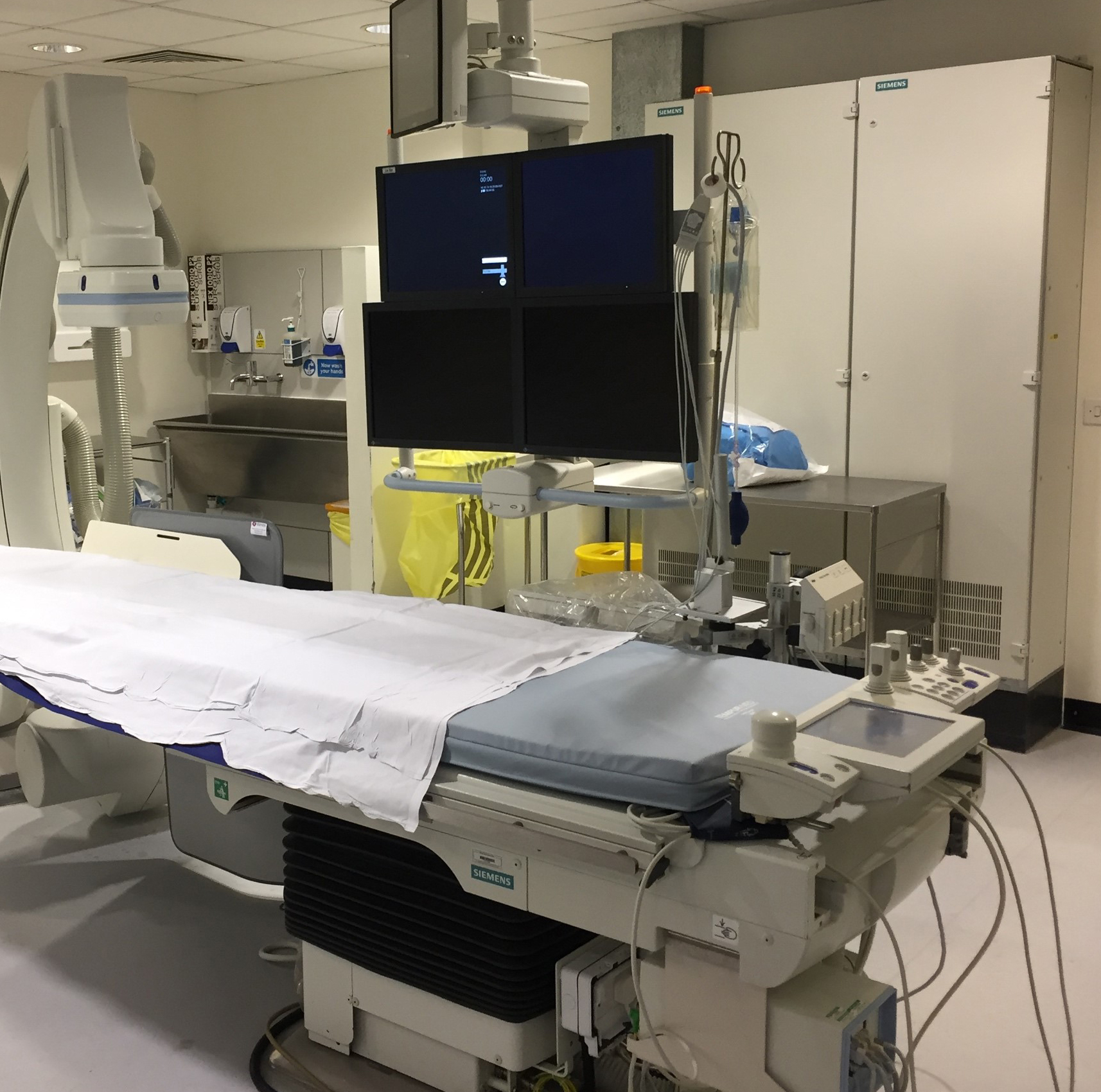
Patient Information
Click on links below to jump to that section
Chest Pain
Chest pain is a common cause of referral for cardiological review. In some cases this is an emergency. If you have chest pain or chest tightness that lasts longer than 15 minutes and is associated with a feeling of severe shortness of breath, sweating or nausea, you should seek urgent help by dialling 999. The pain may sometimes also spread to your jaw, neck, or arms.
Chest pain can have many causes, for instance, stomach problems, musculoskeletal problems (bones and muscles) but may also represent angina.
Angina is usually caused by furring up of the coronary arteries. These arteries supply the heart muscle with blood and nutrients to enable the heart to pump efficiently. The furring up in these arteries is usually due to the build up of cholesterol and happens over a prolonged period of time. It is more common to develop angina if you are or have been a smoker, have high blood pressure or cholesterol, or if there is a family history of heart disease.
It can often be difficult for you to decide what is causing your symptoms and for patients with chest pain we would recommend a review by a specialist.
Investigation of chest pain usually involves a clinical review with a consultant including an ECG (heart tracing). Your own personal risk factors for heart disease will be reviewed – including your blood pressure, weight and smoking history. In addition, blood tests may be undertaken to assess your cholesterol level.
After this consultation it may be necessary to undergo further investigations including echocardiography (ultrasound scanning of the heart), stress testing either on a treadmill or using echocardiography, a CT scan of the arteries (3D X-ray) or sometimes cardiac angiography.
Cardiac angiography involves the insertion of a small tube the wrist (or occasionally the groin). Small tubes (catheters) are then inserted into the heart arteries and x-ray pictures taken whilst injecting dye. If a problem is identified during this test it is sometimes possible to use a balloon to stretch the artery open and implant a stent to keep the artery open.
PCA consultants offer detailed assessment for patients with chest pain with an experienced cardiology consultant and are able to offer a comprehensive heart treatment strategy including access to angiography and stenting.
Leave us a few details about your enquiry and a member of our team will contact you as soon as possible
Heart Palpitations
Heart palpitations are a very common cardiac complaint. Palpitations usually describe the feeling of your heart beating too hard, too fast or slow or irregularly. Some patients describe this feeling as if their heart is racing or skipping, or beating erratically. The feeling of heart palpitations can be very short-lived lasting only a few seconds or can be prolonged lasting hours to days.
Most heart palpitations cause no long term problems, but
in rare cases can be serious. It is wise to be checked by a specialist if the symptoms are persistent or causing significant distress, and especially if the palpitations are associated with other symptoms; for instance shortness of breath, dizziness or feeling faint, loss of consciousness (blackouts) or chest pain.
Heart palpitations can be very distressing and the reassurance that there are no underlying cardiac structural problems is often very reassuring.
Common causes of cardiac palpitations can be skipped heart beats (ectopics), atrial fibrillation, atrial flutter, supraventricular tachycardia (SVT) or rarely ventricular tachycardia. Heart rhythm disorders (arrhythmias) are experienced by more than 2 million people a year in the UK and occur when the electrical impulses that coordinate your heart beats don’t work properly – causing your heart to beat too fast, too slow or irregularly.
Sometimes heart palpitations can be related to lifestyle choices or other medical conditions. For instance, stress is commonly associated with palpitations and some palpitations can be worsened by tiredness, high caffeine consumption or alcohol. In some cases underlying problems elsewhere can cause or worsen palpitations. For example, an overactive thyroid and anaemia can both cause heart palpitations. Some women additionally find that hormonal changes over time can predispose them to palpitations.
People complaining of heart palpitations are usually investigated with a clinical examination and an ECG (heart rhythm tracing). Further investigations may include a prolonged heart rate recording whilst going about your daily routine, insertion of a small chip which can record your heart rate for up to two years, echocardiography (ultrasound scan of the heart) or other cardiac imaging to reassure that there is no underlying serious cause.
Treatments for heart palpitations can involve simple reassurance, or the addition of some medicines to limit the symptoms. In some cases detailed assessment of the electrical system of the heart can be undertaken a specialist to see where in the heart the symptoms are coming from; at this time it is sometimes possible to perform a procedure to treat the abnormality (electrophysiology study and ablation). For a small minority of patients the insertion of a pacemaker may help in the treatment of cardiac palpitations.
PCA offer clinical assessment for people suffering from heart palpitations with both clinical review and, if necessary, further investigations and invasive treatments as mentioned above including electrophysiological studies and the insertion of pacemakers.
Leave us a few details about your enquiry and a member of our team will contact you as soon as possible
Heart Rhythm and Ablation

Heart Rhythm Disorders
Arrhythmias (abnormal heart rhythms) are experienced by more than two million people in the UK each year. Common symptoms include: palpitations, dizziness, shortness of breath and fatigue.
We provide every aspect of arrhythmia care including heart rhythm monitoring to tailored treatment plans with medication and interventional electrophysiological procedures (electrophysiology studies and catheter ablation) if required.
Cardiac electrophysiology study and catheter ablation
A cardiac electrophysiology study is used to investigate what is causing an abnormal heart rhythm. In some people, the abnormal heart rhythm may be amenable to treatment, which is known as catheter ablation.
This can, in most cases be performed at the same time. Ablation therapy can correct a range of arrhythmias which are usually caused by abnormal electric signals sent by the heart muscle; these procedures are performed by Dr Senthil Kirubakaran (consultant cardiologist and electrophysiologist) at the Queen Alexandra Hospital. We have the latest technology for treating arrhythmias using radiofrequency and specialised electroanatomical mapping systems or freezing (cryoablation) with the Cryoballoon.
We perform catheter ablation for the following arrhythmias:
- Supraventricular tachycardias (SVT)
- Atrial tachycardias
- Atrial flutter
- Atrial Fibrillation
- Wolf Parkinson White Syndrome and accessory pathways
- Ventricular Ectopics
- Ventricular Tachycardia
Leave us a few details about your enquiry and a member of our team will contact you as soon as possible
Heart Failure
Heart failure is a common cardiac condition which is characterised by the inability of the heart to pump enough blood around the body. Patients typically run into problems such as breathlessness and shortness of breath on exertion, increasing breathlessness at night time, swollen ankles and feet, potentially a swollen abdomen and palpitations.
Heart failure affects up to 2% of the population wordwide and almost 1 million patients within the United Kingdom.
It can be caused by a variety of common diseases such as high blood pressure (hypertension), survivors of a heart attack, patients who have had previous heart surgery and a variety of other conditions including heart valve disease, inherited disease affecting the heart muscle (cardiomyopathy), previous cancer treatment with chemotherapy and other more rare conditions such as sarcoidosis and amyloidosis.
Heart failure can lead to life threatening problems and calls for a rapid diagnosis and specialist assessment. To aid primary care, a specialised blood test can be performed, called a nt-pro BNP. This may increase the suspicion and heighten the need to see a dedicated cardiologist.
Though this is a serious condition, for those patients with a weakness in the heart pump (left ventricle), there is evidence based specialist medication and technology available to improve symptoms. With a rapid diagnosis and dedicated specialised multi disciplinary team input and care, the patient’s outcome can be much improved. Technology includes implantable cardioverting defibrillators (ICDs) and cardiac resynchronisation therapy (CRT), all of which may be implanted at Queen Alexandra Hospital, Portsmouth. The diagnosis of heart failure though highly concerning, means that the patient should be considered for chronic disease management and long term monitoring.
Professor Kalra and Dr Guha are the two heart failure experts within PCA, and both participate in one of the country’s largest heart failure programmes at Queen Alexandra Hospital, Portsmouth. Beyond the clinical expertise and awareness of the latest cutting edge treatments and technologies, there are embedded links to a number of hospital and community based specialist nurse multi-disciplinary teams. Professor Kalra is the immediate past chair of the British Society of Heart Failure and leads the departmental cardiac research programme. He is the lead for the British Heart Foundation funded national study of intravenous iron in patients with heart failure. Dr Guha has also contributed to a number of heart failure studies, notably being the local primary investigator for the CARDIOMEMs (Remote pulmonary artery catheter) study.
Leave us a few details about your enquiry and a member of our team will contact you as soon as possible
Heart Investigations
PCA offers a full spectrum of cardiac investigations at either the Portsmouth Spire or the Queen Alexandra Hospital in Portsmouth, Hampshire. These tests include:

Non- Invasive Heart Investigations
- Electrocardiogram (ECG) – An electrical tracing of heart activity recorded by attaching 10 stickers.
- Exercise stress testing (exercise ECG) – walking on treadmill with simultaneous ECG.
- Echocardiogram – Ultrasound pictures of the heart
- Contrast echocardiogram.
- Ambulatory ECG monitoring – prolonged recording of ECG worn as an outpatient.
- Ambulatory BP monitoring – Blood pressure monitoring over a 24 hour period .
- Stress Echocardiography – ultrasonic pictures of the heart during exercise or using medications to increase heart rate.
- CT coronary angiography – 3D x-ray of heart .
Invasive Heart Investigations
Coronary angiogram – pictures of coronary arteries taken by inserting a small tube, usually through a small artery in the wrist. This allows your cardiologist to assess furring up within the hearts blood supply as well as to assess the heart function. Often if a problem is identified this can be treated at the same time by the insertion of a stent. In most cases this is undertaken as a day case procedure.
Electrophysiology studies – assessment of the electrical activity in the heart by inserting specialist catheters usually via blood vessels in the groin. This can allow your cardiologist to identify abnormalities which can then allow planning of treatment. Treatment may be in the form of medications or an ablation may be possible. This is usually undertaken as day case procedure.
Transoesophageal echocardiogram – Insertion of a small endoscope via the gullet allows detailed pictures of the heart to be taken to help identify abnormalities.
Insertion of cardiac monitor – Involves a small device being injected under the skin to monitor cardiac rhythm. This device can be interrogated remotely allowing your cardiologist to monitor any abnormal heart rhythms. The batteries in this device can sometimes last up to two years.
Leave us a few details about your enquiry and a member of our team will contact you as soon as possible
Cardiac Treatments
In addition to advice and treatment with medication PCA have access to a number of invasive cardiac treatments based at the Queen Alexandra Hospital, Portsmouth. Before any treatment your specialist will go through the procedure in detail and explain any risks allowing you to make an informed decision on your treatment. Your consultant will also make sure all necessary follow-up and aftercare is in place.
Angioplasty / Stent insertion – Usually undertaken via a small tube being implanted in the wrist this involves the delivery of a small balloon to stretch a narrowing in an artery. In most cases a stent is also implanted. A stent is a small metal tube which is designed to keep the artery stretched open and increase blood flow to the heart muscle. This is usually carried out as a day case procedure under local anaesthetic and often follows on immediately after a coronary angiogram.
Pacemaker insertion – Insertion of a small battery and leads under the skin to regulate heart rhythm. This involves the placing of one or two leads via a vein, usually from under the left collar bone. It is performed under local anaesthetic and is often a day case procedure. A pacemaker battery generally lasts up to 10 years.
Complex Device Insertion – In some patients, especially those with heart failure, a family history of cardiac problems or survivors of cardiac arrest, specialised pacemakers (devices) may be beneficial. This involves either a pacemaker which helps to restore coordination in the heart contraction (known as cardiac resynchronisation therapy) and/or the insertion of a defibrillator to provide an electrical shock to the heart in the case of any dangerous heart rhythms. All these procedures are generally carried out as a day case procedure under local anaesthetic and sedation.
Ablation – With some forms of heart rhythm problems treatment can be performed by identification and delivery of energy to the problem area. In some cases of atrial fibrillation, the areas of the heart most likely to cause this can be isolated in the same way. This involves the insertion of small catheters from the groin into the heart and is carried out under local anaesthetic or general anaesthetic depending on the case. Dr Kirubakaran is an expert in heart rhythm disorders and leads the arrhythmia services at Queen Alexandra Hospital in Portsmouth, Hampshire, where he performs catheter ablations for fast heart rhythm disorders. PCA have access to the latest technology available including advanced electroanatomical mapping systems and Cryoballoon therapy.
Leave us a few details about your enquiry and a member of our team will contact you as soon as possible
Valve Disease and Murmurs
Heart valve disease and heart murmurs are a common and under diagnosed cardiac condition. It can affect all age ranges from early adulthood right through to patients in their eighties and nineties. Heart valves function to control blood flow through the different chambers in the heart known as atria and ventricles. Due to a variety of conditions, including infection, genetic abnormality, the ageing process or associated conditions, the heart valves may be damaged and wear out. This either leads to a leak (regurgitation) and /or a narrowing (stenosis) which ultimately may progress and lead to symptom developing including heart failure. If a heart valve is severely affected the patient may experience breathlessness, swollen ankles or frequent palpitations.
Early diagnosis is important to identify heart valve disease and to allow for appropriate follow up and treatment. Investigations may include serial evaluation using ECG treatments (heart tracing) and echocardiography (ultrasound of the heart). Depending on the severity of the valvular disease, the patient may require cardiac surgery which can be provided at partner hospitals including Southampton and Brighton. For certain patients, particularly with aortic valve disease, they may be eligible for a TAVI (transcutaneous aortic valve implant) – a keyhole technique which can replace the aortic valve.
Following successful repair or replacement of the valve, the patient may require longer term surveillance once again, all of which can be provided by PCA. Drs Siva, Stewart and Jones have particular interest in these areas and lead and partake within the echocardiography service at Queen Alexandra Hospital, Portsmouth
Leave us a few details about your enquiry and a member of our team will contact you as soon as possible
General Cardiology Check
Increasingly as consultant cardiologists we are aiming to identify patients at risk of heart disease at an early stage. This allows us to reduce the chances of long term damage to the heart. This is especially important in patients with conventional risk factors for heart disease such as patients with:
- A history of smoking
- Hypertension (high blood pressure)
- Diabetes
- High cholesterol
- A family history of heart disease
However, anyone can develop heart disease and if you are concerned about your heart we would be happy to see you to discuss this.
A number of tests can be arranged if required including an electrocardiogram (ECG), Stress testing and echocardiography. In combination with a full physical examination and blood tests your consultant will be able to talk you through your personal risk profile and provide reassurance. If a cardiac problem is identified then your consultant will be able to talk you through your treatment options and get these arranged in a timely fashion.
PCA consultants offer appointments at your convenience for full cardiac assessment including for mortgage or insurance applications.
Leave us a few details about your enquiry and a member of our team will contact you as soon as possible
Sports Cardiology
Exercise is of huge benefit to most people, including most people with heart disease. However, in rare cases exercise can unmask heart disease and even lead to cardiac arrest. For this reason in some countries (but not the UK) all young athletes and sportsmen and women, are routinely screened for heart disease, as are amateur athletes participating in some endurance events.
We provide a screening service for athletes and other individuals wishing to start athletic training (eg. wanting to start running or train for a specific event), particularly those with known heart disease, risk factors for heart disease or a strong family history of heart disease.
Our screening service including review by a Cardiologist experienced in Sport’s cardiology and appropriate screening tests (likely to include an ECG (heart tracing) an Echocardiogram (heart scan) and, if necessary, an exercise treadmill test. Our consultants understand athletes and sport – having participated in various sports, athletics and endurance events themselves (such as Ironmen triathlons and ultra-marathons) to a high level.

Leave us a few details about your enquiry and a member of our team will contact you as soon as possible
High Blood Pressure

High blood pressure (hypertension) is a common condition. Whilst it is generally not associated with symptoms, uncontrolled hypertension can have long term complications including an increased risk of stroke, heart attacks, kidney problems and eye sight issues. In fact hypertension is one of the biggest worldwide risk factors for the development of heart problems.
The only way to find out if you have high blood pressure is to have it measured. This can be done at home if you purchase a BP machine or at your GP or pharmacist. When having your blood pressure taken you will receive a result with two numbers, the top number is called the systolic and the bottom number is the diastolic pressure. The pressure is measured in mmHg (millimetres of mercury).
If the systolic blood pressure is higher than 135mmHg or the diastolic blood pressure is higher than 85mmHg you may have high blood pressure and should be assessed by a doctor
In most cases there is no underlying cause to having high blood pressure, but a full assessment by a doctor is recommended, to see if there are interactions with other medical conditions you may have, which could cause hypertension.
If you do have hypertension then treatment can be as simple as lifestyle changes or may involve medications.
PCA can offer a full physical assessment of people with high blood pressure by cardiology consultants and can provide comprehensive investigation and treatment strategies to control blood pressure.
Leave us a few details about your enquiry and a member of our team will contact you as soon as possible
Contact us
Leave us a few details about your enquiry and a member of our team will contact you as soon as possible
